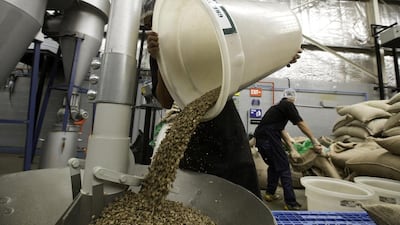Coffee Planet, the UAE coffee roaster, has had a 38 per cent rise in revenue on last year as the world’s coffee markets are braced for price increases caused by drought in Brazil and a leaf rust fungus affecting Central America.
Coffee Planet’s hedge against supply troubles and its farming network of over 20 countries has mitigated the need for price increases.
“We are up 38 per cent year on year for revenue, which is heavily linked to coffee consumption,” said Robert Jones, the company’s managing director. “We saw the volatility from Q4 last year and locked in prices for nine to 10 months. We roast in excess of 45 tonnes of coffee a month in Dubai and sell about 10,000 cups daily. We have established relationships with farmers in over 20 countries around the world who we deal with directly.
“We aren’t able to hedge all the price increase, but we were able to manage it. Although the prices have gone up we felt a big impact on our margin, but it’s not got to the extent that we have had to re-manage our pricing at the consumer level. Our coffee will still be Dh12 for a 12-ounce cappuccino.”
Coffee Planet began in 2008 and is now sold in more than 200 petrol stations across the UAE. It also supplies a significant amount of coffee to the food service market, selling to five-star hotels, airlines, catering companies and offices.
The local coffee roaster has grown into one of the biggest roasters and traders of unroasted beans in the country, but its size and growth have not always managed to stop price increases.
“Last year we had to increase prices as a result of the price of coffee,” said Mr Jones. “However it was also because of the price in doing business in general which is continually escalating – rents, transport, labour, etc. But we hadn’t had a price rise in about four years, so we were certainly well below the market, and we still are.”
Bulk ordering and the ability to hedge against the price has given large coffee merchants the ability to mitigate against big increases in the cost of premium arabica beans, but for those who do not have the substantial capital or global connections with coffee producers, price rises seem inevitable.
Another UAE coffee roaster, which supplies to many independent cafes, said it was poised to raise prices by a single-digit amount.
“I can see the company raising prices by about 8 per cent, it will then be up to the cafes and other establishments that buy from us whether they pass it on to the customers,” said an employee, who did not wish to be named.
The arabica price is up by 76 per cent so far this year.
Retail prices have risen in the United States, including for JM Smucker’s Folgers, the country’s best-selling brand, as well as at Starbucks.
In the UAE, shisha shops are also experiencing price pressures.
“We charge Dh5 for a cup of coffee,” says Khalil, who provides shisha pipes in Al Hajaz Coffee Shop in the capital. “We use Turkish coffee as the customers like it, we have seen more business as the shops near to us have now doubled their prices to Dh10 for a cup of coffee, it happened suddenly but we kept our prices the same.”
ascott@thenational.ae
Follow The National's Business section on Twitter


